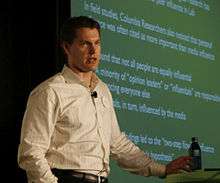Duncan J. Watts
| Duncan Watts | |
|---|---|
 Watts presenting at iCitizen 2008 | |
| Born |
Duncan James Watts February 20, 1971[1] Guelph, Ontario[1] |
| Residence | New York City |
| Nationality | Australia |
| Fields | Sociology, network science |
| Institutions |
Columbia University Microsoft Research Santa Fe Institute Yahoo! Research Nuffield College, Oxford[2] |
| Alma mater |
University of New South Wales Cornell University (PhD) |
| Thesis | The structure and dynamics of small-world systems (1997) |
| Doctoral advisor | Steven Strogatz[3] |
| Doctoral students |
Gueorgi Kossinets Roby Muhamad Matthew Salganik [3] |
| Known for |
Watts and Strogatz model Six Degrees: The Science of a Connected Age[4] |
|
Website research | |
Duncan James Watts (born 1971) is a sociologist and principal researcher at Microsoft Research, New York City known for his work on small-world networks.[5][6][7][8][9][10][11][12][13][14][15][16][17]
Education
Watts received a Bachelor of Science degree in physics from the University of New South Wales and a Ph.D.[1] from Cornell University.
Career
Watts was past external faculty member of the Santa Fe Institute and a former professor of sociology at Columbia University, where he headed the Collective Dynamics Group.[18] He is author of the book Six Degrees: The Science of a Connected Age[4] and Everything is Obvious *Once You Know the Answer: How Common Sense Fails Us.[19] The six degrees research is based on his 1998 paper with Steven Strogatz in which the two presented a mathematical theory of the small world phenomenon.[20]
Until April 2012, he was a principal research scientist at Yahoo! Research, where he directed the Human Social Dynamics group.[21] Watts joined Microsoft Research in New York City by its opening on May 3, 2012.[22][23]
Watts describes his research as exploring the "role that network structure plays in determining or constraining system behavior, focusing on a few broad problem areas in social science such as information contagion, financial risk management, and organizational design."[24] More recently he has attracted attention for his modern-day replication of Stanley Milgram's small world experiment using email messages and for his studies of popularity and fads in on-line and other communities.
References
- 1 2 3 Watts, Duncan James (1997). The structure and dynamics of small-world systems (PhD thesis). Cornell University.
- ↑ http://everythingisobvious.com/the-author
- 1 2 Duncan J. Watts at the Mathematics Genealogy Project
- 1 2 Watts, Duncan (2003). Six Degrees: The Science of a Connected Age. W. W. Norton & Company. ISBN 0-393-04142-5.
- ↑ Watts, D. J. (1999). "Networks, Dynamics, and the Small‐World Phenomenon". American Journal of Sociology. 105 (2): 493–527. doi:10.1086/210318.
- ↑ Watts, D. J.; Dodds, P. S.; Newman, M. E. (2002). "Identity and Search in Social Networks". Science. 296 (5571): 1302–1305. arXiv:cond-mat/0205383
 . Bibcode:2002Sci...296.1302W. doi:10.1126/science.1070120. PMID 12016312.
. Bibcode:2002Sci...296.1302W. doi:10.1126/science.1070120. PMID 12016312. - ↑ Watts, D. J. (2002). "A simple model of global cascades on random networks". Proceedings of the National Academy of Sciences. 99 (9): 5766–5720. Bibcode:2002PNAS...99.5766W. doi:10.1073/pnas.082090499.
- ↑ Dodds, P. S.; Muhamad, R.; Watts, D. J. (2003). "An Experimental Study of Search in Global Social Networks". Science. 301 (5634): 827–829. Bibcode:2003Sci...301..827D. doi:10.1126/science.1081058. PMID 12907800.
- ↑ Watts, D. J. (2004). "The "New" Science of Networks". Annual Review of Sociology. 30: 243–270. doi:10.1146/annurev.soc.30.020404.104342.
- ↑ Dodds, P.; Watts, D. (2004). "Universal Behavior in a Generalized Model of Contagion". Physical Review Letters. 92 (21). arXiv:cond-mat/0403699
 . Bibcode:2004PhRvL..92u8701D. doi:10.1103/PhysRevLett.92.218701.
. Bibcode:2004PhRvL..92u8701D. doi:10.1103/PhysRevLett.92.218701. - ↑ Watts, D. J. (2005). "Multiscale, resurgent epidemics in a hierarchical metapopulation model". Proceedings of the National Academy of Sciences. 102 (32): 11157–11162. Bibcode:2005PNAS..10211157W. doi:10.1073/pnas.0501226102. PMC 1183543
 . PMID 16055564.
. PMID 16055564. - ↑ Duncan J. Watts at DBLP Bibliography Server
- ↑ List of publications from Microsoft Academic Search
- ↑ Duncan J. Watts's publications indexed by Google Scholar
- ↑ Duncan J. Watts from the ACM Digital Library
- ↑ Duncan J. Watts's publications indexed by the Scopus bibliographic database, a service provided by Elsevier. (subscription required)
- ↑ Clive Thompson (February 2008). "Is the Tipping Point Toast?". Fast Company. Retrieved 2008-02-25.
- ↑ CDG Collective Dynamics Group
- ↑ Watts, Duncan (2011). Everything Is Obvious: *Once You Know the Answer: How Common Sense Fails Us. New York: Crown Business. ISBN 0-385-53168-0.
- ↑ Watts, D. J.; Strogatz, S. H. (1998). "Collective dynamics of 'small-world' networks" (PDF). Nature. 393 (6684): 440–442. Bibcode:1998Natur.393..440W. doi:10.1038/30918. PMID 9623998.
- ↑ Herald Sun. Australian social-network researcher Duncan Watts leaves Yahoo.
- ↑ Floridia, Richard. "Why Microsoft Chose New York City", The Atlantic: Cities, 2 May 2012. Retrieved on 8 May 2012.
- ↑ Knies, Rob. "Microsoft Research Microsoft Research Debuts N.Y.C. Lab", Microsoft Research, 7 May 2012. Retrieved on 8 May 2012.
- ↑ Home page of Duncan Watts at Yahoo Research
External links
Duncan Watts page at Microsoft